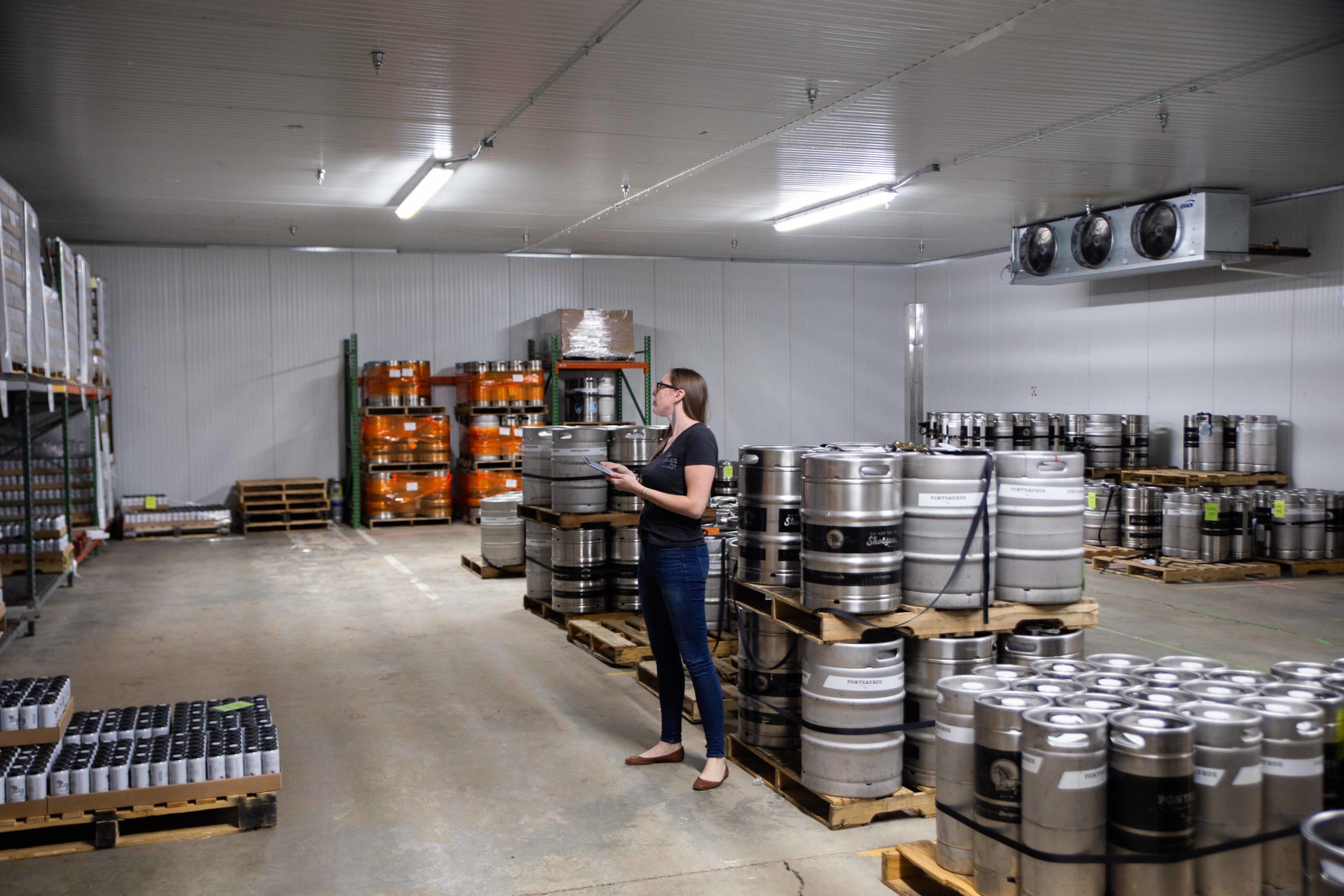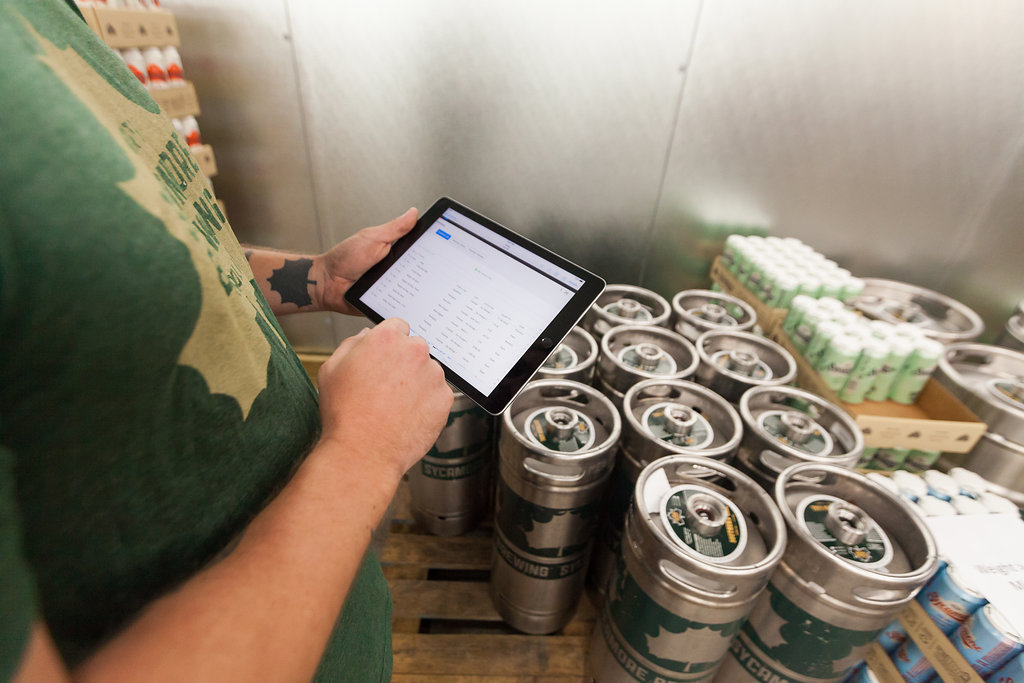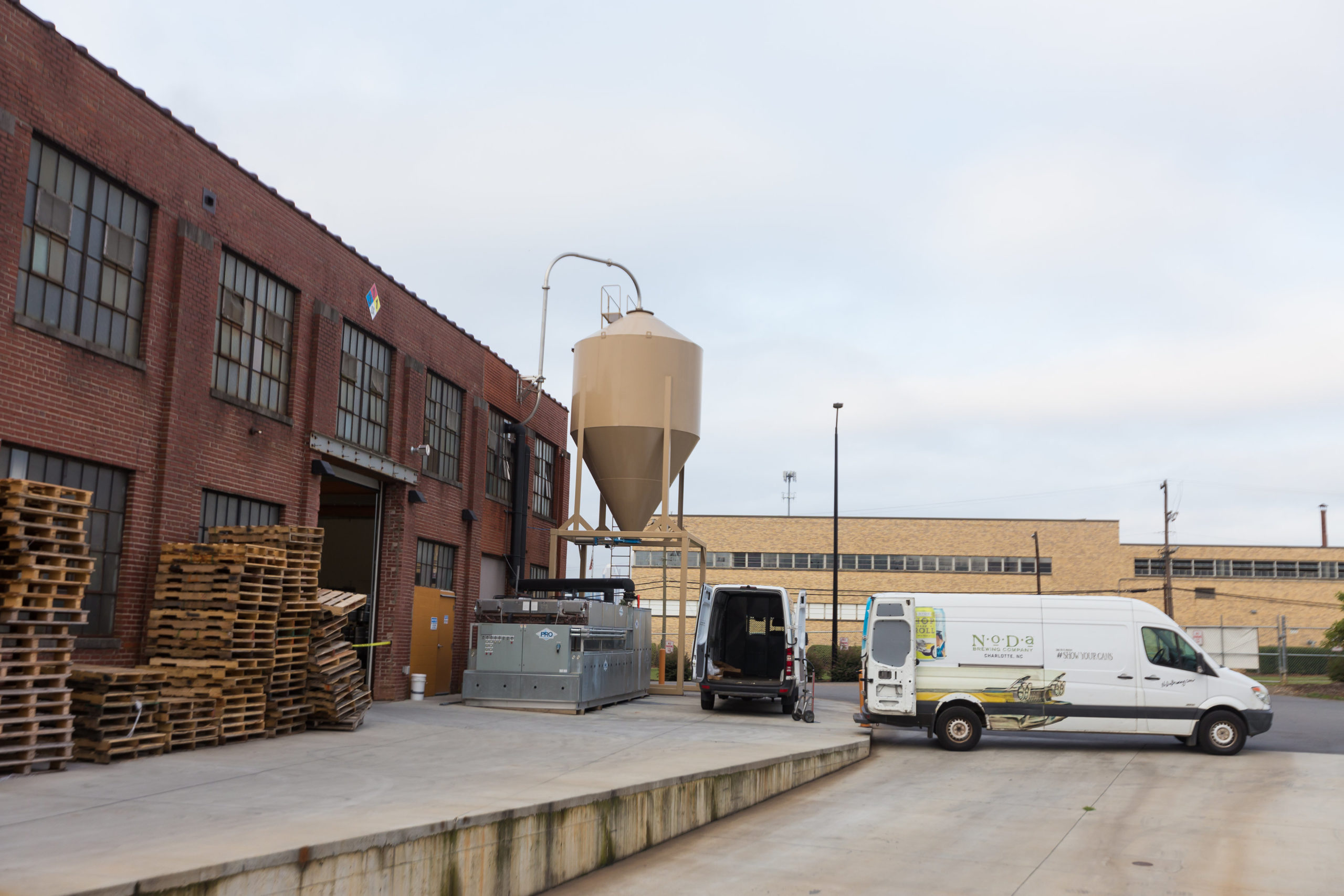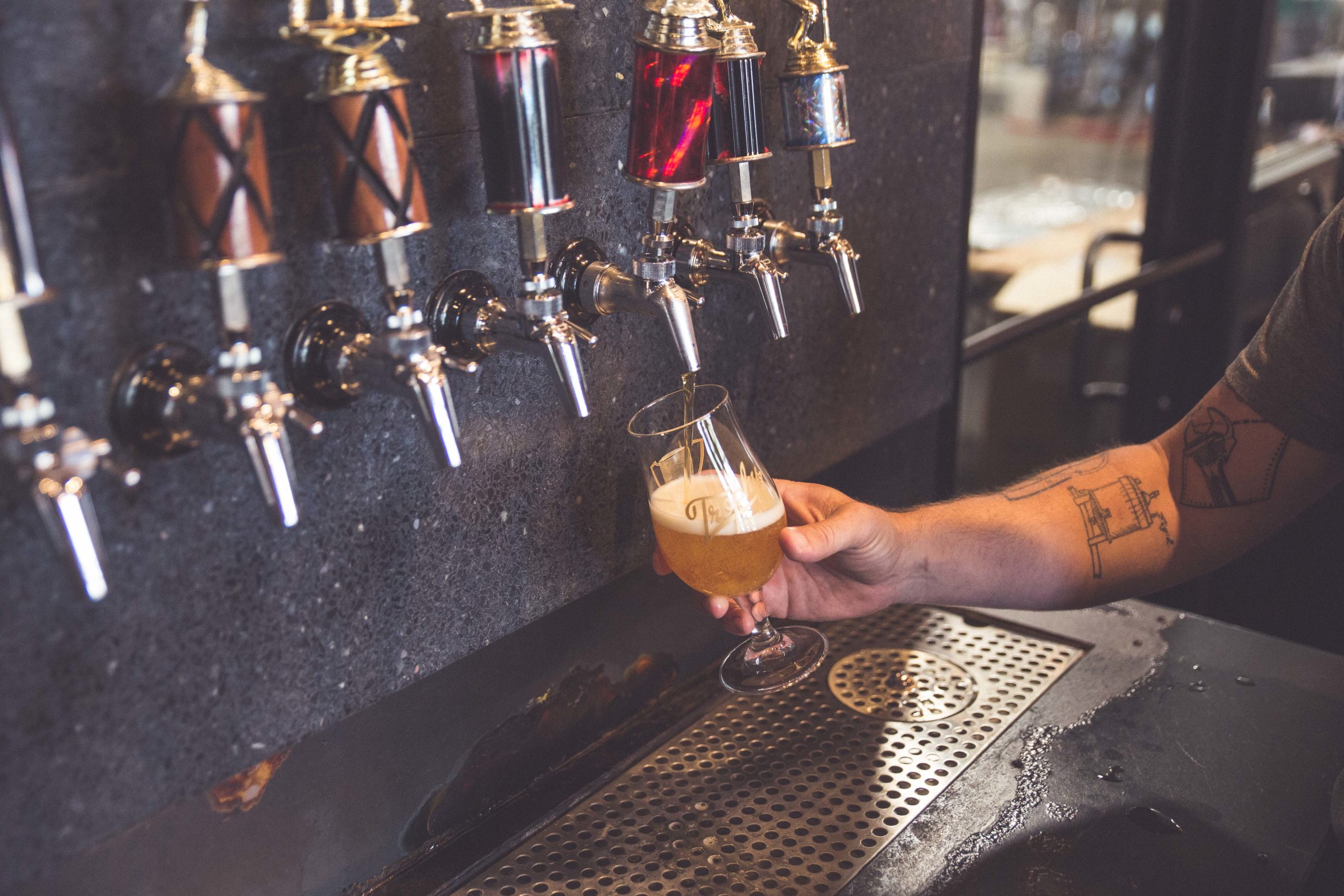Alcohol distribution is a beast. There’s no easy way to do it. Either you’re taking on all the logistics yourself (and dealing with the associated headaches and costs) or you’re trying to work with a wholesaler to get your beer in the right stores and restaurants. If you work with a distributor, it might be because self-distribution simply isn’t permitted in your state. But for many breweries looking to expand into new markets — or those that have simply grown too large to handle distribution themselves — partnerships with wholesale distributors can have big benefits.
If you’re trying to figure out how to make this relationship work for your brewery, we have some advice. First, go into the partnership with the right expectations. The reality is that your craft brewery is probably a small fish in a big pond when it comes to distribution. Fair or not, you have to find a way to work within the system if you go the distribution route.
Our biggest piece of advice before diving in? Remember that you and your distributor have the same goal: to sell more beer. To that end, mutual respect and regular communication go a long way.
Beer Distribution Statistics: How Many Breweries Work With a Distributor?
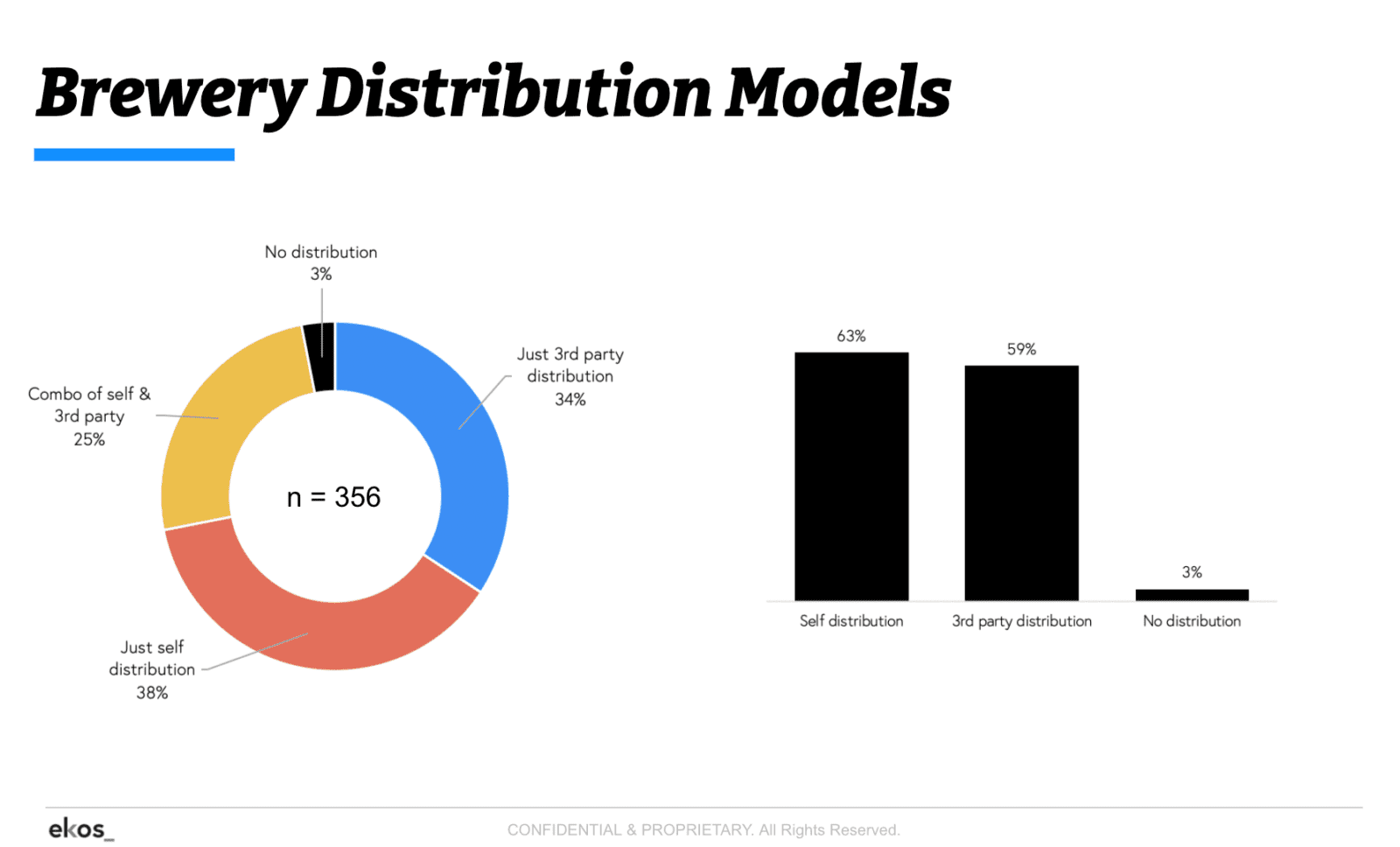
In 2020, we surveyed breweries to find out what their distribution models looked like. We found that 59% of breweries we surveyed were using a distributor, either in addition to or in lieu of self-distribution. As you can see in the chart above, a quarter of the respondents reported using both self-distribution and third-party distributors to get their product out in the market.
It’s not surprising that the use of third-party distributors increases as brewery production volume increases. Below, you can see that 22% of small breweries we talked to exclusively used distributors (with no self-distribution), compared to 71% of large breweries. If your brewery has major expansion plans on the horizon and you’re not yet working with a distributor, chances are you’re considering it. Use the tips in this post to get the most out of the partnership if you decide to go that route.
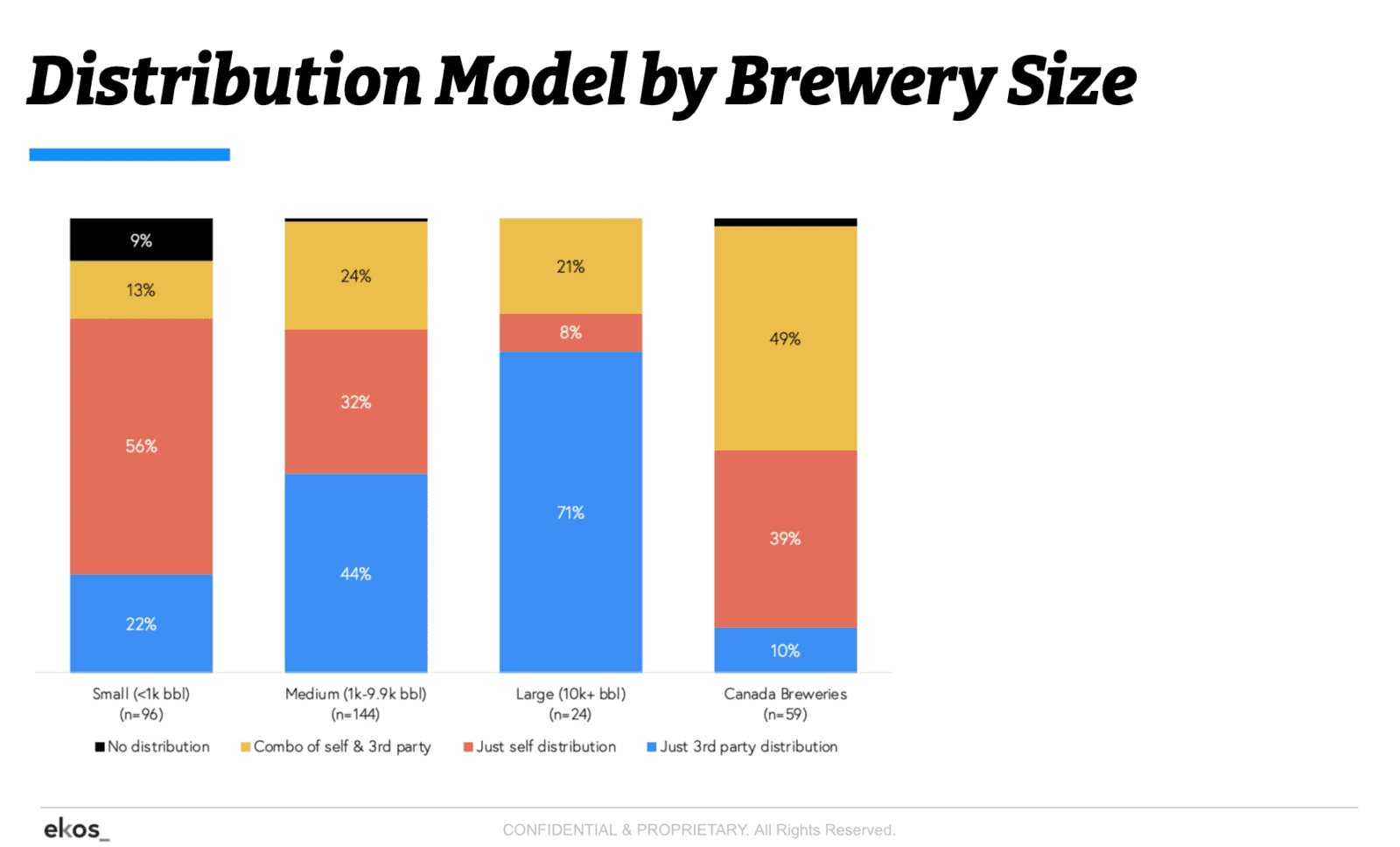
Tips for Successful Brewery-Distributor Relationships
1. Make a plan, and focus on what works.
Be clear about your expectations from the beginning. You should know what you want from your distributor and what they want from you. That includes the all-important pricing discussion, but it extends beyond that as well. These expectations should be established before you ever sign a contract. We know that sometimes your power to negotiate is limited. But if you have any leeway at all, use it to make sure you’re getting the best deal possible. When it comes to pricing in particular, you may only get one or two chances per year (if that) to increase the prices your distributor pays, and your contract will likely dictate the size of those increases. Make sure those initial prices work with your target profit margins, because if they don’t, you may never be able to catch up.
When it comes to planning distribution, think annually. Distributors have relatively rigid calendars (and an entire portfolio of brands). So, think about how your production calendar fits with their marketing and sales calendar. It’s unlikely that a distributor will change its schedule to fit yours, so consider how you can align production plans to maximize sales impact throughout the year.
Speaking of production, wholesalers generally aren’t thrilled about building an entire distribution strategy around experimental products. If you have flagships that consistently sell well and have name recognition in the market, plan to make a lot of those beers. Or if you’re known for your seasonal releases, tell your distributor about the major ones so they can plan marketing campaigns accordingly. Innovation has its place, but distributors want products that customers will buy. Make sure you know what those are.
2. Share your passion with the distributor.
“Share your passion” might sound like cliche business advice, but in this case it can have a real impact. Education is everything when it comes to how prepared (and excited) a distributor’s sales representatives are to sell your products. Start with a kick-off meeting after you sign the contract to fill in the staff on your brewery’s story and your unique position in the market. Pro tip: Bring samples. Nothing fires up a craft beer sales rep like drinking a great beer. And be sure to schedule regular follow-ups throughout the year (quarterly is good) to give seasonal updates and introduce yourself to any new reps that have come on board.
When it comes to figuring out what to say in these meetings, here are some questions to think about:
- What makes your beer great? Are your ingredients top-notch? Do you innovate with high-tech production practices or stick to tried-and-true techniques?
- Do you specialize in a certain style of beer? What are you known for?
- How do you ensure high quality? What’s your testing process like? Talk about your QA lab if you have one. Quality is of the utmost importance to wholesalers.
- Besides your actual product, how would you describe your brand? What are your customers like? How do you connect with them through your marketing?
If you have well-established marketing or brand guidelines that you can share with your distributor, be sure to do so. The more information and resources you can give your wholesale partner, the better equipped they’ll be to market and sell your products.
3. Take a hands-on approach to building relationships with customer accounts.
No matter how much you’ve told the sales reps about your brewery, they won’t be able to talk about it the way you can. That’s why putting in the effort to visit retail and on-premise accounts is so important. You can be successful without it, but those personal relationships can take your distribution to the next level.
Of course, your team may not be able to visit every single account. Your time is limited. Work with your wholesaler to determine which accounts would benefit most from facetime with your team. They might recommend the bigger stores, high-volume restaurants, or popular local beer bars. Knowing and bonding with the key influencers at each account can help keep your brand top of mind when they’re deciding what to buy from the distributor. Competition is fierce, so that personal touch can make all the difference.
4. Communicate frequently and efficiently.
When working with a wholesale distributor, you want to keep in touch regularly to discuss progress on key accounts, ordering projections, and major upcoming campaigns or events. But you don’t want to clutter your inbox or waste your time with unnecessary emails and calls about upcoming or in-progress orders.
To that end, inventory and production management are vital to ensuring a smooth relationship with your distributor. They want to work with producers that have a tight grip on their processes and know what’s ready to sell, what’s in progress, and what’s up next in the production queue. If you haven’t nailed that down yet, working with a distributor will be a headache.
When it comes to ordering, you can make your life easier by using a digital tool. An ordering portal helps distributors clearly see what inventory you have available to sell to them and helps you manage incoming orders all in one place. Avoid the frustration that back-and-forth emails and calls cause. Use the time you have with distributors to iron out strategy, not administrative or logistical details.
Buy Back Time You Could Be Using to Hone Your Distribution Strategy
Time is the enemy of all business owners. There are only so many hours in the day for you to accomplish your seemingly endless list of to-dos. Stop wasting time on manual tasks and let Ekos streamline your brewery’s inventory, production, sales, and accounting processes. With our latest innovation, Ekos Order Hub, you can simplify the ordering experience for your distributors and reduce the time your team spends on related administrative tasks. (A win-win, if we’ve ever seen one.)
Take a self-guided tour of Ekos now, or contact our team for your personalized 20-minute demo.
